
Photos and story by Donald H. Harrison
SAN DIEGO—The sanctuary and social hall of Temple Emanu-El were transformed into an exhibit hall for 55 local artisans, with many of them exhibiting Judaica in various media on Sunday, Nov. 2. I went around to the booths and asked artists offering Judaica for sale why Jewish objects and designs particularly appeal to them. I received a variety of answers, as I worked my way around the synagogue. Here’s what the artists had to say in the order that I met them:
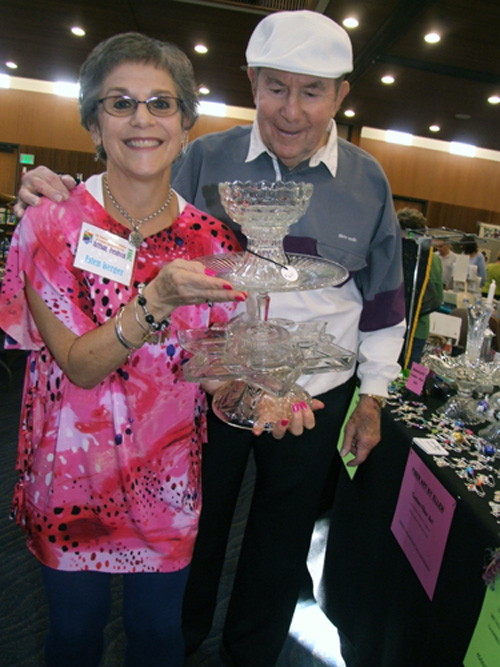
Ellen Berger: “I love to make Judaica because I love to show that I am Jewish; to wear symbols that in mysticism are for protection. I am proud to be Jewish and to let people know that I am Jewish and to share. I am not doing it because I think there is a market for it, although there is a need for it, but I am doing it because it is unique and I want to incorporate Judaism into my art.”
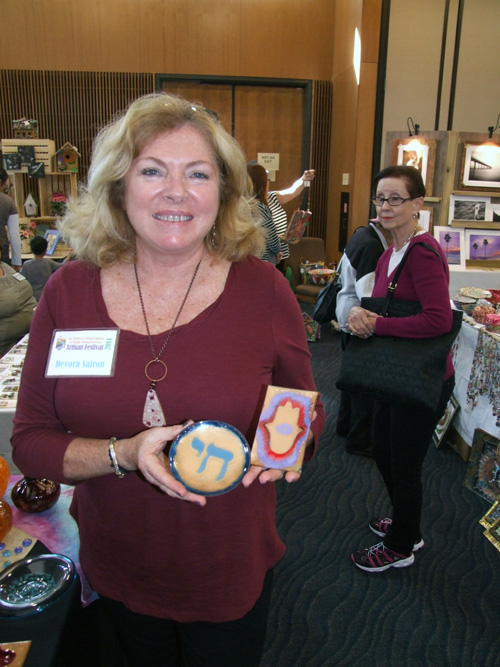
Devora Safran: “I think it is in your blood. When you are growing up Jewish, and going to temple, you’re seeing art, and when I was growing up the art was very traditional and I always thought I should put a more contemporary spin on it — the stuff that appeals to me.”
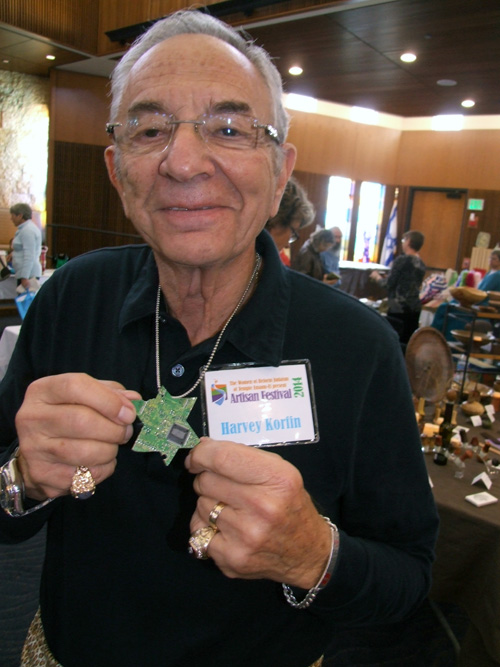
Harvey Korfin: “To me it is my ethnic background, my grandparents coming over from the old country, just the way I have been raised. I have been a member of Temple Emanu-El for close to 30 years. Always as a kid we were going to services and following the customs. I want to make Judaica just because it is instilled in what we do. It gives you a sense of pride to do it. At this show we are giving 10 percent of all our sales to Mazon, to feed the hungry. You’ve got to give back a little bit…”
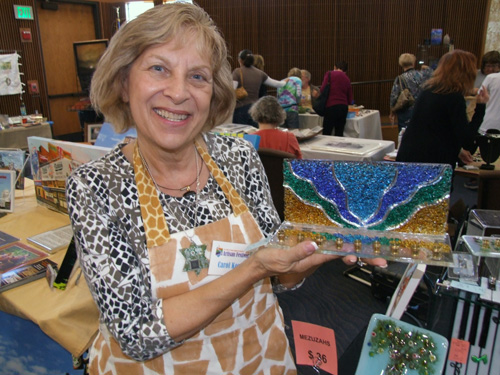
Carol Korfin: “I feel very connected to my Judaism and I always have been kind of artsy. I’ve always admired some of the Judaica I saw in glass and when I took a class in making fused glass, I came home and told my husband (Harvey, above) ‘this is it, I’ve found my passion.’ The first thing I did was for my family. I made mezuzahs for every one and then I branched out and did seder plates and menorahs. I find them very creative and interesting to people. Not only do they like them and they can’t buy them anywhere else, but it is a great conversation starter. When we go to the shows, the interesting thing is the people we meet. And when you have ‘Judaica’ on your sign, people tend to sort of open up. They don’t have to guess whether you are a member of the tribe. They know.”
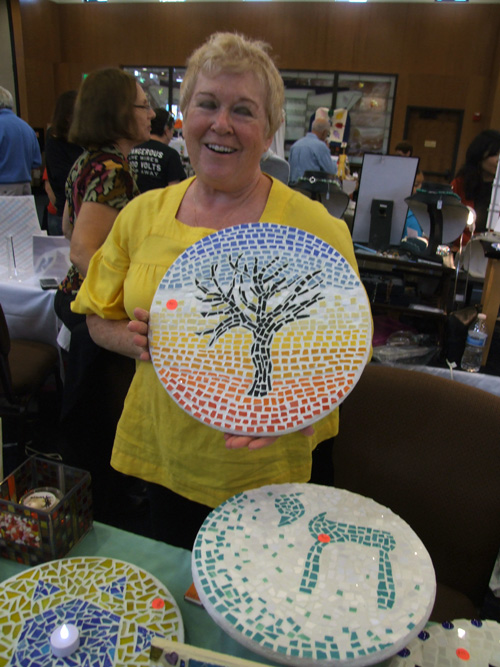
Sarit Segal: “The reason that I choose a Judaic theme is because Lazy Susans are generally placed on the dining room table for the family to use, and they are perfect for Shabbat with two candles and a glass of wine, and they are perfect for Shabbat dinners. Anytime you have people over and they are curious about Judaism, this is certainly a good way to get the conversation going.”
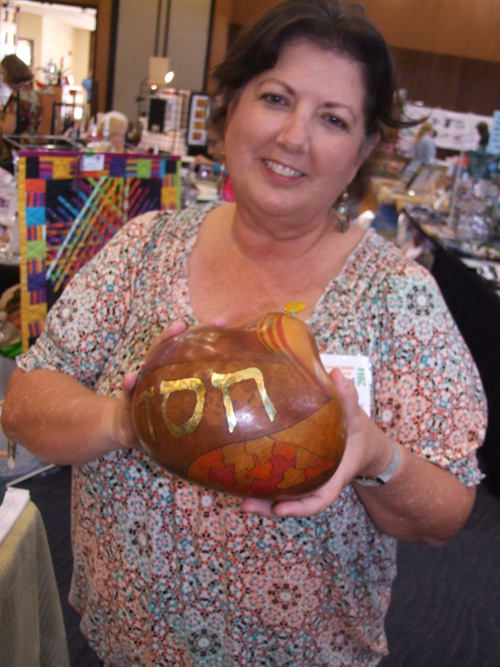
Linda Hutkin Slade: “For me, Judaica is an expression of my Judaism. I sing in a choir at Temple Solel and when I listen to the words of the prayers and the songs, I feel like they can be transformed into a piece of art. And that is why I do it. Art is a way of releasing tension and stress and at the same time creating something of beauty, hope and healing. I work as a social worker and I know that that is an important piece for many people to have as well.”
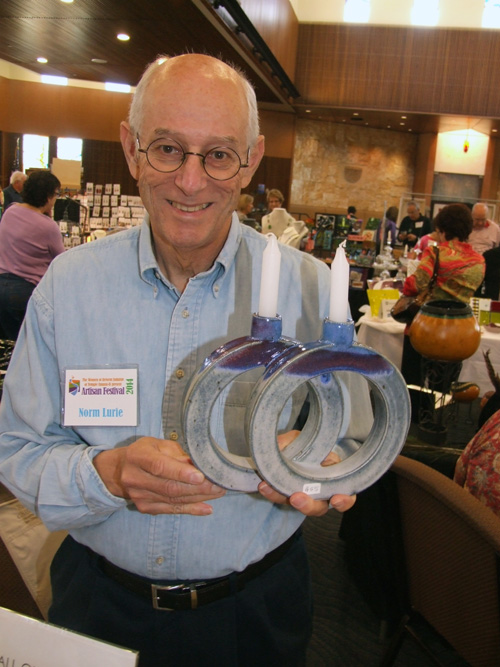
Norm Lurie: “I find that there isn’t a lot of other Judaica ceramics that I’ve seen around San Diego. I am hoping this would be a market. Lots of people make bowls and mugs, but not that many make hannukiahs. Also being Jewish that adds to it. I like to make things that people use… for holidays, Shabbat candle holders, for Chanukah. We could have kiddush cups — things that people use all the time to express their Jewishness, that would make me happy.”
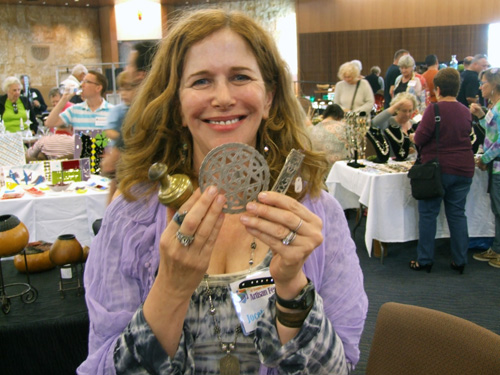
Jocelyne Okrent: “This is the collection of Rita Okrent, who was my mom. She was an ethnic and tribal bead dealer starting from the 1970s. My mother visited Israel many times and she bought a whole collection of Judaica and concentrated as well on silver… a lot of that was Yemenite Jewish silver work…. I particularly like hamsas and I think they make great pendants and have meaning to people. Sometimes people don’t want to wear big Jewish stars on their ears but they will wear hamsas. … I am a temple member and my children are in the Torah school.”
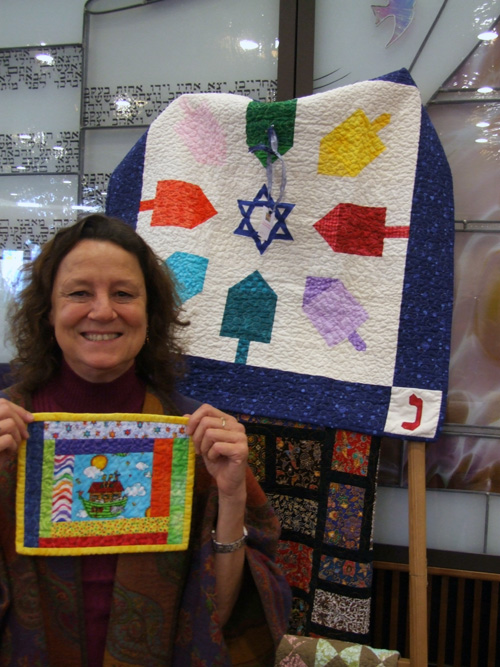
Nancy Tyrell: “I have all these Judaic mug rugs or snack mats, one with Noah’s Ark, another with dreidels and a menorah. And here is a table topper or a wall hanging. (She’s not Jewish and) “I wanted to find something that would appeal to the audience.”
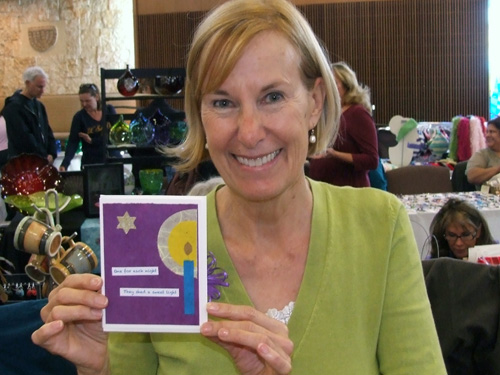
Marion Black: “I love making Chanukah cards although I am not Jewish myself. My sister converted to Judaism so I always made Chanukah cards along with Christmas cards. This one has the lines from one of the Chanukah songs, “one for each night, they shed a sweet light to remind us of long, long ago.” When I was in grade school in Squirrel Hill in Pittsburgh, it was a very Jewish neighborhood and there was no one in our class during the High Holy Days except three of us. And we learned ‘Silver Bells’ and ‘The Chanukah Song’ and so when I made that card with the lines from the song, it had a lot of meaning to me…”
*
Harrison is editor of San Diego Jewish World. He may be contacted via donald.harrison@sdjewishworld.com
Don, you’re such an enthusiastic interviewer! It was a pleasure to talk with you, and I was amazed to see how quickly you put this article up. The festival was a real joy, and I already look forward to next year!
Wonderful event. This year’s Artisans were even better than in years past. It was fun to schmooze and buy beautiful items.
Wonderful synopsis of event. Truly enjoyed all of the beautiful art available,
The festival was a celebration of many arts and a pleasure for me as a vendor to be a part of!
Wonderful article….thank you so much for your support these last couple of weeks! It was a wonderful
day for all the artisans!
What a great article and photo spread about our temple’s show, Don!